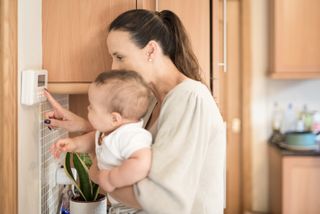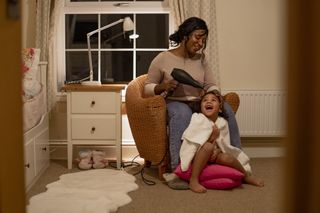How many hours a day should heating be on in the UK and what's the ideal room temperature?
We explain how many hours a day your heating should be on, when you should put it on, and what the ideal room temperature is, as well as answering whether it's cheaper to leave the heating on all day


Recent updates
This article has been updated to reflect the latest changes to the energy price cap, it has also been fact-checked, new information added and any out of date information removed.
With temperatures dropping and energy prices still high, it's no wonder many families are wondering how many hours a day the heating should be on for, so they can keep warm, but also keep their bills as low as possible.
Ever since April 2022, when the energy price cap rose by 54%, families have been worried about how much their energy bills will cost. But while prices are coming down (the price cap dropped by £151 on 1 October), they are still higher then before the energy crisis took hold.
Heating expert at trades matching site MyJobQuote, Matthew Jenkins, says: “Colder weather means you’re more likely to need the heating on more. But this is an issue as many people are struggling with the high energy prices and heating typically accounts for more than 50% of your entire energy bill.”
It therefore pays to be smart about not only the cheapest way to heat a room, but also how much you have your heating on.
How many hours a day should heating be on?
Families tend to have their heating on for an average of 5 hours and 15 minutes on a winter's day at an average of 19°C, according to British Gas. But how long you should have your heating on over the winter will depend on a few factors, including:
- how cold it gets
- your lifestyle
- your health condition
- whether you have small children
- and the type, age and condition of the property you live in.
Heating expert Matthew Jenkins says: “There’s no right answer to how many hours a day your heating should be on. The colder it is outside, the longer it’ll take your house to heat up. Your age and health need to be factored into the equation as does the size of your house and level of insulation you have. A small, well insulated home may only need the heating on for a few hours a day, while a larger home with minimal insulation is going to need it on for much longer.”
While energy prices have come down, they are still higher than they were over winter 2021. Between October 2021 and March 2022, the price cap was set at £1,227, now (until the end of December 2023) it's £1,923. So if you want to keep your bills as low as possible, it's advisable to only use your heating when you need it.
While there is no law against leaving your heating on all day and night, with energy prices as they are, this will be an expensive option. (Remember that the figure stated under the energy price cap is not a maximum you will pay regardless of how much energy you use. This figure is illustrative based on typical use in a typical house. If you use more energy than 'typical', you will easily pay more than £1,923 per year for your energy).
If you find your home doesn't retain the heat, it's worth looking into any grants or schemes you may qualify for that will help you to improve your home's insulation to prevent heat from escaping too easily, or to swap your boiler for a more efficient one. It could also be worth trying this radiator hack to see if you can reduce how often you need to have your central heating on.

When should your heating come on?
For most people, the peak times for central heating are 7am and 7pm, but ultimately when you put the heating on will depend on your lifestyle and circumstances.
According to Ovo Energy, around 70% of households tend to programme their heating to come on twice a day, and turning it on for an extra hour when it is especially cold. This works especially well for those who are out during the main part of the day to avoid heating the home unnecessarily.
Thomas Halpin from Price Your Job, says: “In order to feel the most benefit, it’s recommended that you switch your heating on during the morning and evening time. First thing in the morning and once the sun goes down tend to be the coldest points of the day. So if you’re limiting heating system usage, these are the best times to run your heating to keep you feeling most comfortable.
“Turning your heating off at night and when you’re not home can help you to save substantially on your overall energy bills. However, often night-time can be some of the coldest hours of winter, so don’t struggle through the night if your home is reaching catastrophically low temperatures.”

For those home during the day, it's still best to avoid having your heating on constantly. You could try having your heating coming on first thing in the morning (ideally about half an hour before you normally get up), once in the middle of the day and for a couple of hours in the evening.
Heating expert Thomas Halpin adds: “If you’re working from home, you may want to consider heating just one room of your house while you work, rather than paying the price for whole-house heating each day.”
In terms of when you should put your heating on for the first time after the warmer months, there isn’t a singular moment when all customers switch on. According to British Gas, the majority of people switch on their heating when the minimum daily temperature is below 9°C for a prolonged number of days. The date that people typically switch on their heating is 24 October.
Where you can, especially on milder days, try and opt for alternative cheap ways to keep warm, including using a blanket or wearing an extra layer. In the evenings, you could choose an electric blanket, which costs less to run than your central heating, but can still keep you toasty warm. (Check out our guide to how much it costs to run an electric blanket to find out what kind of costs you're looking at).
Is it cheaper to leave the heating on low all day?
Unfortunately, it's not cheaper to leave your heating on low all day instead of programming it to come on as and when you need it. This is especially the case in homes that are less well insulated, where heat escapes more easily. Leaving your heating on low is one of those cheap heating myths that will actually end up costing you more money.
General manager at underfloor heating specialist Wunda Group, Tom Edmunds, says: “Leaving your heating on in every single room is needlessly expensive, especially if you aren’t using every room that you are heating. If you’re having to leave the heating on all day as the rooms aren’t getting warmer or retaining heat, it would be worth determining how well insulated your home is; and finding where you can make improvements.
“If you’re going away for a long period of time it may be tempting to let the heating run periodically, but this is unnecessary. Instead, turn the heating down or off to prevent spending money unnecessarily – but avoid switching the boiler off entirely as this can cause faults which lead to larger costs later. Use holiday mode or anti-frost settings if your thermostat has them so that your pipework continues to be protected even in sub-zero temperatures.”

If you're looking to keep energy bills as low as possible, try turning your thermostat down by a single degree. This can save 10% on your energy bill according to the Energy Saving Trust.
We've also compared the cost of running a gas fire versus central heating to see which is cheaper to help you make sensible choices that will keep your energy bills as low as possible.
How much does it cost to run central heating?
How much central heating costs to run is a difficult question to answer as it depends on so many variables, such as the type of system you have, the size of your home, how efficient your home and boiler are, as well as where you live and how often you use the heating.
But when trying to answer this question for our sister site Homebuilding.co.uk, Martyn Bridges, technical director from Worcester Bosch, has suggested that a typical Worcester Bosch boiler running 10 radiators in a three-bedroom detached house with two to three people living in it will use a reasonable average of 10,000kWh a year.
With the current cost of 1kWh of gas capped at 7p, you're looking at about £700 a year. If used daily for six months of the year, that works out at about 3.84 per day.
What's the ideal room temperature?
The ideal temperature at home, which is the lowest at which you can be comfortable, is between 18 and 21°C, according to the Energy Saving Trust.
The World Health Organisation also states in its Housing, Energy and Thermal Comfort report that an 'adequate standard of warmth' for healthy adults in appropriate clothing is a minimum of 18°C in occupied rooms in the UK.

Overnight, while tucked under your duvet, you may not need temperatures to remain as high as 18°C to be comfortable. But for babies, The Lullaby Trust does advise that the best room temperature is 16-20°C to keep your baby comfortable and safe. This temperature is recommended by Pampers too.
“To keep your rooms at their ideal warmth, simply set your thermostat’s temperature to this level,” advises MyJobQuote’s Matthew Jenkins. “Do make sure your thermostat is placed away from the radiator and ensure there’s reasonable air circulation in the room where it’s located. This will help it to work properly.”
But what happens should the temperature in your home fall below recommended temperatures? According to a 1996 study from housing expert Richard Moore, there are health risks associated with temperatures that fall either side of the recommended ideal.
- Anything less than 9°C – Risk of hypothermia
- 9-12°C – Risk of strokes, heart attacks
- 12-16°C – Risk of respiratory diseases
- 16-18°C – Discomfort, small health risks
- 18-21°C – Comfortable temperatures
- 21-24°C – Increasing discomfort
- 24°C and above – Cardiovascular risk of strokes and heart attacks
But remember - using blankets, hot water bottles and extra layers can help you to warm up (we've done the sums to see which is cheaper to use - an electric blanket or a hot water bottle), but sometimes only your central heating will warm your home up adequately.
Remember if you are struggling to pay your energy bills, help is available. Speak to your energy provider in the first instance who will be able to give you bespoke advice to lower or help you pay your bills.
Goodto Newsletter
Parenting advice, hot topics, best buys and family finance tips delivered straight to your inbox.

Sarah is Goodto.com’s Money Editor, covering various aspects of family finance - everything from energy price cap, cost of living payments and food prices to major sales, money saving tips and how to get more for less. A writer, journalist and editor with more than 15 years' experience, Sarah is allergic to confusing jargon and hates money-saving hacks that don’t actually save you money. As well as putting a spotlight on the money news that will actually impact your family life, Sarah is also the Goodto team’s guru on how to tell a good deal from a dud and the best way to dodge price hikes. When not writing about money, or picking the brains of leading personal finance experts, Sarah can be found hanging out with her rockstar dog Pepsi, getting opinionated about a movie or learning British Sign Language.
- Rachel WaitPersonal finance expert
-
 The adorable sign Prince Louis can’t wait to be a future King like his brother Prince George
The adorable sign Prince Louis can’t wait to be a future King like his brother Prince GeorgeThe Wales youngster made a telling move during a secret visit to the Strictly Come Dancing studios
By Selina Maycock Published
-
 This baby name is giving 'retro chic' vibes and it's predicted to be a top choice for parents in 2024 – would you choose it?
This baby name is giving 'retro chic' vibes and it's predicted to be a top choice for parents in 2024 – would you choose it?It’s stolen the limelight right at the last minute
By Daniella Gray Published
-
 Cheapest places for your Christmas dinner staples revealed in new research, but where does your usual supermarket rank on the list?
Cheapest places for your Christmas dinner staples revealed in new research, but where does your usual supermarket rank on the list?New research has ranked the nation's favourite supermarkets from cheapest to most expensive for Christmas dinner essentials
By Sarah Handley Published
-
 'I need to split myself in two to be a working mum' New report lays bare the 'disproportionate impact' childcare has on a mother's career
'I need to split myself in two to be a working mum' New report lays bare the 'disproportionate impact' childcare has on a mother's careerNew research has highlighted the struggle working mothers have trying to balance their work and family life
By Sarah Handley Published
-
 Tooth Fairy tax is a thing, and it's doubled within a generation, but here are 4 money-alternative ideas you could try instead
Tooth Fairy tax is a thing, and it's doubled within a generation, but here are 4 money-alternative ideas you could try insteadToday's parents are paying considerably more for this family tradition than their parents did
By Sarah Handley Published
-
 How to recycle LEGO: can you stick it in the recycling bin and what else can you do with old bricks?
How to recycle LEGO: can you stick it in the recycling bin and what else can you do with old bricks?Knowing how to recycle LEGO is essential for families looking to declutter their toy stash and free up some space
By Sarah Handley Published
-
 When does Black Friday end? Timings of the annual sale weekend explained
When does Black Friday end? Timings of the annual sale weekend explainedBlack Friday 'weekend' is here, but it pays to know when the Black Friday sales end so you can bag a bargain before it's all over
By Sarah Handley Published
-
 Last chance! Get £10 tickets to major UK attractions, including Cadbury World and LEGOLAND Discover Centres in the Merlin Cyber Monday sale
Last chance! Get £10 tickets to major UK attractions, including Cadbury World and LEGOLAND Discover Centres in the Merlin Cyber Monday saleThat's a saving of up to a whopping 52%!
By Sarah Handley Published
-
 Child benefit warning for parents as payment cut off looms
Child benefit warning for parents as payment cut off loomsParents of 16 and 17 year olds could risk losing their child benefit payments at the end of November
By Sarah Handley Published
-
 What is the motherhood penalty? We look at just how women are paying for having children and why
What is the motherhood penalty? We look at just how women are paying for having children and whyNew research estimates that three in four single mothers will struggle to afford essentials in their retirement thanks to the motherhood penalty
By Sarah Handley Published